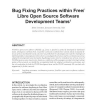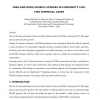127
click to vote
ECEASST
2010
14 years 11 months ago
2010
: Free/Libre Open Source Software (FLOSS) projects can be considered as learning environments in which heterogeneous communities get together to exchange knowledge through discussi...
125
click to vote
CE
2008
15 years 18 days ago
2008
This empirical paper shows how free/libre open source software (FLOSS) contributes to mutual and collaborative learning in an educational environment. Unlike proprietary software,...
129
click to vote
JDM
2008
15 years 2 months ago
2008
Free/libre open source software (FLOSS, e.g., Linux or Apache) is primarily developed by distributed teams. Developers contribute from around the world and coordinate their activi...
111
click to vote
FIRSTMONDAY
2008
15 years 2 months ago
2008
How do licenses participate in Free and Open Source Software (FLOSS) community life? This paper aims at answering this question. Despite the dynamic character of FLOSS development...
CSMR
2009
IEEE
15 years 8 months ago
2009
IEEE
Past software engineering literature has firmly established that software architectures and the associated code decay over time. Architectural decay is, potentially, a major issu...
114
click to vote
HICSS
2009
IEEE
15 years 8 months ago
2009
IEEE
Due to their characteristics and claimed advantages, several researchers have been investigating free and open-source projects. Different aspects are being studied: for instance, ...
122
click to vote
ICCV
2009
IEEE
16 years 7 months ago
2009
IEEE
Subspace segmentation is the task of segmenting data
lying on multiple linear subspaces. Its applications in
computer vision include motion segmentation in video,
structure-from...


